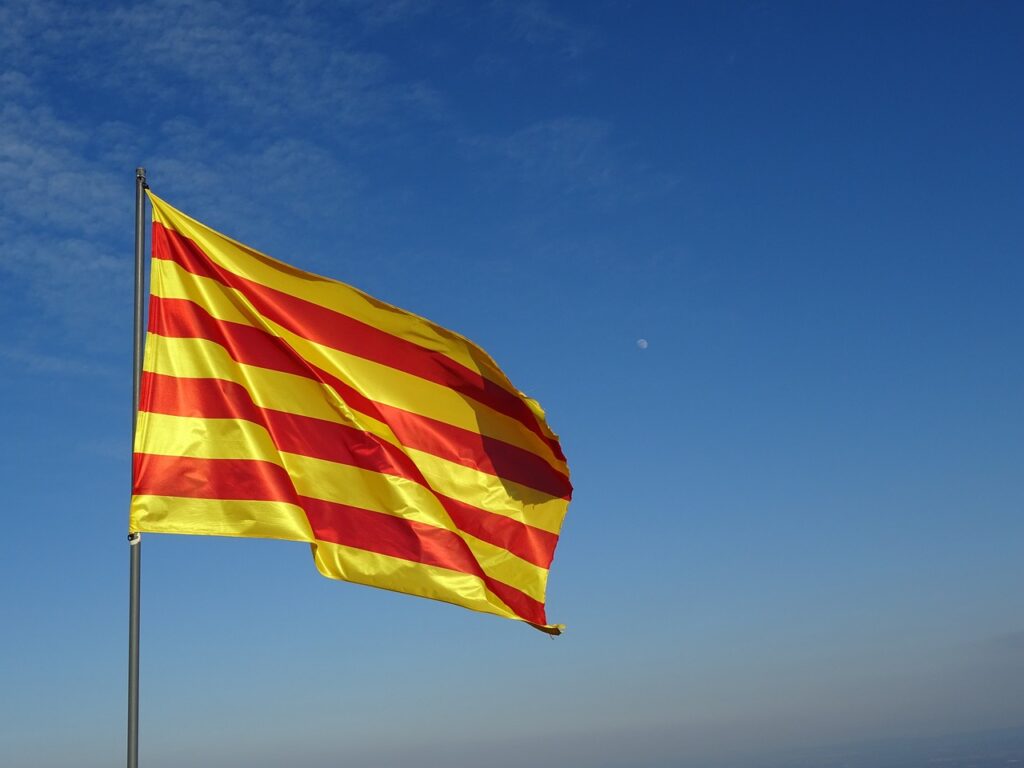As a member of APG (Association of Professional Genealogists), every year one must complete a certain number of hours as a part of your “continued education”. Currently, the number is set to 12 hours and the professional learning opportunities may range from: “college courses, institutes, conferences, discussion groups, lectures, webinars, online courses (not college), self-directed study, or other” (APG). So recently this month I reported my “continuing professional education” to the APG for 2023.
Below, I will share the various things I did this year to keep learning in the world of genealogy and then focus on one specific aspect, as the title suggests, learning Catalan.
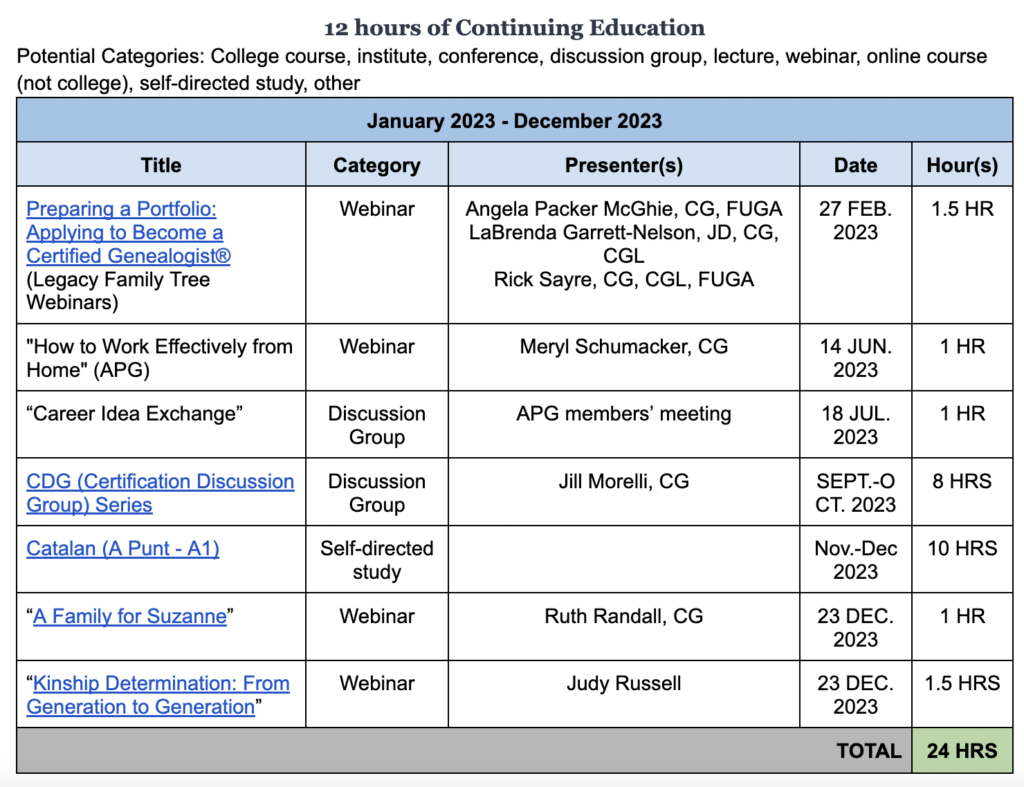
Last year, I took four webinars (5 hours), participated in two discussion groups (9 hours), and spent a good chunk of time studying Catalan (10 hours). Without studying Catalan, my hours still hit the 12 hour minimum needed. Now, you might be asking – why would I include Catalan in my genealogical continued education chart?
For me personally, “foreign” language use is inherently tied to my genealogical research. I put quotes around the word foreign because Spanish is not a foreign language for me; it is a language I grew up with and have used all of my life. Except that in my English-dominated American genealogical circle, Spanish along with other languages might not be the main language of research for others. My research for my own family has led me to use Spanish and French (daily for Spanish or sporadically for French) and though I have known for manyyy years now that I have ancestors from Mallorca, I had never really dipped my toe into learning Catalan.
Recently though with my two visits to Mallorca last year, I got more curious about the language and I wanted to take a stab at learning it. Especially with the free time I have here in Spain, I wanted to use that constructively as well.
So ultimately, I decided to include Catalan in my continued professional educational report because by studying the language, I will have an easier time understanding the documents I discover in regards to my ancestors. This is especially important when it comes to analyzing notarial records from the island that date because to the 17th century in Catalan.
How do you go about studying a foreign language…? And especially by yourself?!?
Here are some things I did when it came to learning Catalan. For some context: I have studied Spanish, French, Russian, and Mandarin Chinese (both in/out of school) and have studied a myriad of other languages here and there on my own for self-interest. I am also a foreign language teacher who has taught nine years of Spanish and two years of English abroad, so much of my advice are things I do either for myself or for my students in order to teach myself/them a foreign language.
Self-Study Catalan
Step 1: Prerequisites
How difficult will this language be compared to your “base” language? Will the grammar, the letters or the sounds be completely different or similar to your eyes and ears? As an English speaker, Catalan might seem difficult but as a Spanish speaker a lot of the words are similar, the grammar so far seems to be close enough that I won’t have too many confusions (looking at you past tense preterite in Catalan!!). Though the pronunciation is not exactly the same as Spanish (more on this later) it is close enough that I can approximate the sounds OR draw from French to be able to say most of the vowels correctly.
Doing this “pre screening” is important because it will dictate how much you can ultimately learn on your own. Since Spanish and Catalan are very similar languages, I knew that from the start understanding the writing was not going to be extremely difficult and coupled with the fact that I studied French, this was going to serve as another reference point. So even though I didn’t know what abans meant from a Spanish perspective I could use French avant to understanding it means ‘before’.
It is worth going on Google and learning more about the language you are interested in and seeing what it will require for you to be able to have a good foundation in the language (whatever that may mean to you). It may, for example, require you getting a tutor/private teacher or joining a course in order to understand more complex grammatical structures (for example: learning the subjunctive tense might be difficult from an English speaking mind-frame).
Step 2: Resources
Another important step is figuring out what kind of resources you will need on your language learning journey. Since I was going to learn another Romance language, I knew that I could almost manage the beginning part of my language journey alone. This meant that I could use textbooks and other things such as podcasts, music, and social media to help me supplement the grammar and vocabulary I would be learning.
It is important to provide yourself with authentic listening material in any foreign language. Even if it is a language you will mainly be using to read, I personally believe that listening skills are just as important to carve out space for in your brain.
Here is some of the material I have been using so far!
Textbooks
Thanks to a coworker at my current school, I was recommended the series “A Punt” by her friend who is actually a Catalan teacher himself. The series comes in sets of two (llibre de l’alumne & llibre d’exercicis) which you can purchase for levels 1, 2, 3, 4, 5, and 6. These books range from A1-C2 (these levels pertain to the CEFR – Common European Framework of Reference for Languages). Since I started from the very beginning of Catalan, I bought the A1 (beginner) books first.
Online on their website, you can also download (for free!) the audios that accompany both the student textbook and workbook which is great. I was hesitant about buying the workbook but decided to do it for this first book and I have been enjoying having the possibility of practicing right away what I have learned.
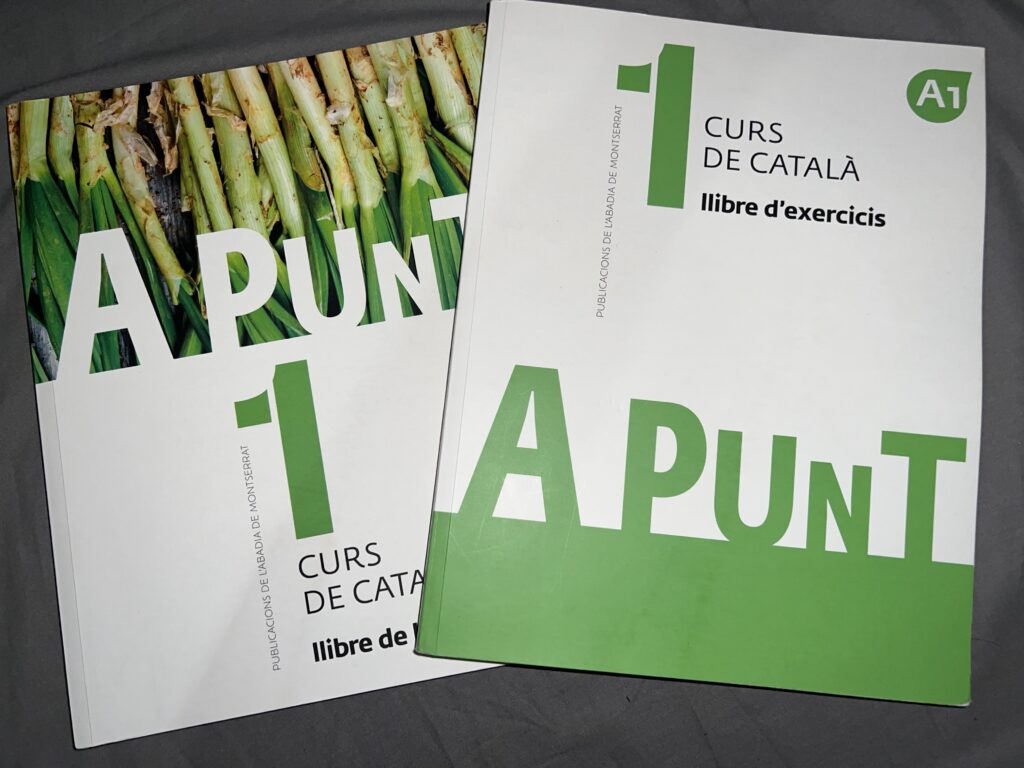
Podcasts
In order to provide myself more listening practice I searched for some podcasts in Catalan and came across “EasyCatalan” a part of the “Easy Languages” series. You can find their podcasts on various platforms (I personally use Apple Podcasts) and you can access it via the link above. Similarly, they also have a YouTube page you can check out as well.
In my opinion, podcasts (especially those geared to language learners) are a great way to get listening input in another language. Whether on a run, a walk, or simply making dinner (my favorite ways to listen to a podcast) – you can listen in a natural way to the language and learn as you listen.
Personally, I find that I do not like driving and listening to podcasts (unless I am on a long stretch of the highway for hours) because I find that my attention is way too divided to be able to listen attentively.
Therefore, find what works for you!
Duolingo
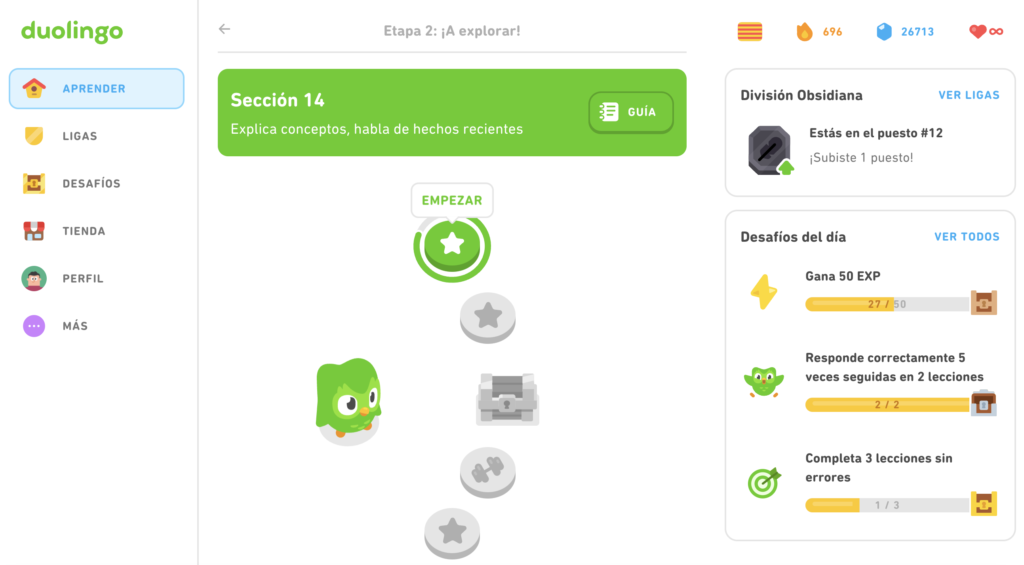
Another great resource (if it is available for your language of interest) is Duolingo. I have noticed that a lot of people will complain about Duolingo (it does not running smoothly, it is clunky, it is robotic, etc.) but when asked when was the last time they used, it they will reply “ohh, some years ago now”.
Duolingo has made a lot of progress when it comes to language learning, curriculum scaffolding, audio clips, grammar explanations, etc. Granted, if the language is fairly new or not fully developed, yes, you will be using a beta version that will have some kinks that need to be worked out. However, if the language has been thoroughly fleshed out it can be super helpful for practice. Granted, I would not recommend you only use Duolingo as you acquire a language, but it definitely can be a useful tool.
I tend to use Duolingo either on the train as I ride to/from work and I also tend to use it on my computer if I want to practice a bit faster and to write quicker. Currently, Catalan is only available from Spanish so you can not learn Catalan with English as the base language. I imagine this is something they will change in the future.
Music
Similarly, music is a great way to learn new vocabulary words and listen to the accent of a language. The podcast “EasyCatalan” recommends some artists they personally like but you can also explore top songs in the language of the country as well. Right now I have been listening to Txarango (a band from Barcelona) and recently learned about Oques Grasses (a band from Roda de Ter, Osuna, Cataluña, España).
Not only do I listen to music on my commute or while doing household chores, but I sit down with the lyrics and take them apart in order to learn either new phrases, new words, or grammatical patterns.
Here’s an example with a new favorite song titled “La Dansa del Vestit” by Txarango. Since I was just learning about Catalan sounds I marked some important ones like silent letters and the double /ll/ as [ʎ]. In blue you can see the new words I had learned, some are very similar to Spanish such as “tresor”, “camí”, and “arc” but I wanted to make sure they were not “false friends” or incorrect cognates.
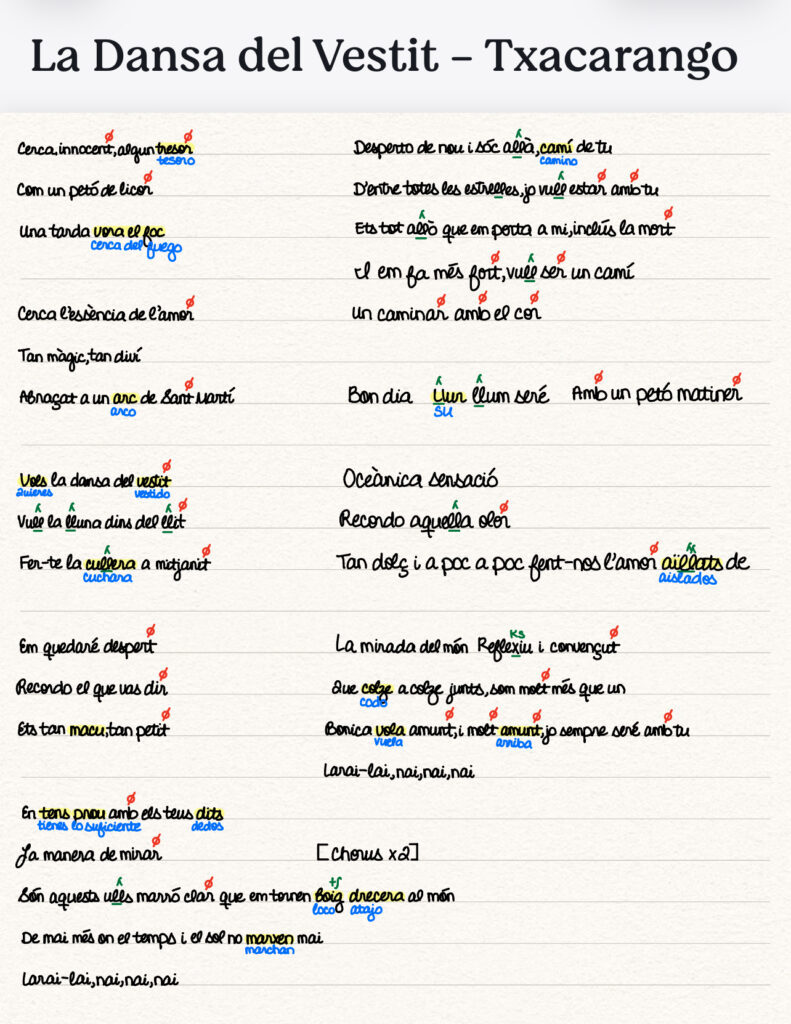
Social Media (Instagram, Youtube, Tandem, Etc.)
This might be a more advanced step in your language learning process but finding accounts with which to engage with in the target language can also be a good way to advance your learning. Finding comedians in the language, pages with memes, YouTube channels, Instagram accounts, and even potential speaking partners on platforms like Tandem can be a great way to further your abilities in the language.
Currently, I think I am about to enter this stage of learning Catalan as I try to find other resources that can help me engage with the language in a more natural way. Most textbooks and podcasts are probably geared to introducing a slower trickle of the language, while material such as music or other sources that are made for native speakers can be a great way to push you to engage with the language outside of the “learning” bubble.
Step 3: Effort
What you put in is what you get out – this is the case for many things in life, and language learning is no different. Many people believe that language learning becomes impossible after a certain age and that the “window” closes after you grow up.
“Children are sponges” seems to be the most common statement I hear in regards to language learning and why someone, say, at the age of 25 can “no longer” master a language.
However, studies are beginning to show that it is not necessarily age, if not other contributing factors such as time and dedication that can be instrumental when it comes to learning a foreign language.
So it is not necessarily doom you will expect to meet as you try to master German at 20, if not, other daily responsibilities which get in the way of your German learning process (work, groceries, household chores, commuting, children, etc.).
So effort is ultimately a big determining factor as to how fast and how easily you will be able to learn another language. Dedicating a few hours a week to language learning (grammar practice, podcast, music, vocabulary exercises, etc.) will ultimately add up in your “language bank” and help take you in the right direction to fluency.
Granted, yes it is possible that you may not easily acquire the German pronunciation as easily as you get older, for example, since you are more likely to lose the ability to distinguish certain sounds with age, but I am fairly sure that with practice and training you are able to teach your brain (and mouth) how to distinguish various sounds in other languages (such as the ü in German!). This is the case for me and the Catalan pronunciation of the “LL” as [ʎ] which is quite different than the “LL” [j] we have in Spanish. It is a new sound I am incorporating into my pronunciation toolbox and I spend time listening to it and practicing it with new words such as llibre, llengua, lliure, llapis, etc.
Which brings me to accents and dialects!
Accents/Dialects
When learning a foreign language, you might have to decide which accent or variation of the language you want to learn or master. With Spanish for example, there are many accents and variations of the language present that even for native speakers we might come across others who use the same word but in another way that leaves us confused (an example: plátano for either the green or yellow banana). Similarly, an accent like the Caribbean one might be difficult for a learner who has been only exposed to central Madrid Spanish or Mexican Spanish. So the more exposure you have to various language differences, the better you will train your ears!
In Catalan, not only are there different accents (east, west, and central Catalan) but we also seem to have an issue of politics. This is something worth researching if you do not know much about it but Catalan and Valenciano for example do not consider each other to be the same language (though they are mutually intelligible and my textbook says otherwise) and in Mallorca you might offend someone by calling their language català (Catalan) and not mallorquí (Mallorquin).
Below is a perfect example of the differences between Catalan from the mainland and Catalan from the Balearic Islands. Though you might not speak Catalan, listening to the interviewers’ accent you can tell there is a difference in comparison to those being interviewed. The main difference being that Mallorcans use more of the [ə] sound in comparison to mainland speakers. This can make the accent sound a bit more closed and harder to understand because you don’t know where the /e/ or /a/ is in a word because it will just sound like an [ə] which is like an “uh” sound, this letter is known as the ‘schwa’, when unstressed.
This video (in Catalan) below also does a great job at explaining some of the different characteristics using a video from Miquel Montoro, a kid from Mallorca who speaks Catalan in the Balearic accent.
An Example: Magraner
A good example of this is my Mallorcan family’s surname: Magraner.
I have always pronounced it the Spanish way [ma.gra.nér]. However, now that I know about unstressed vowels becoming [ə] in Mallorcan Catalan, I have come to realize that the surname is pronounced quite differently on the island. In “Magraner”, both /a/ sounds become [ə], the final /r/ is not usually articulated in Catalan, and the finally /e/ is stressed and thus takes on the [é] sound. No worries about the squiggly looking “v”, which actually is an allophone of the /g/ sound when it is intervocalic. So ultimately the name sounds more like [məɣɾəné] in Mallorca!
This quite literally blew my mind and if it was not for studying Catalan I would have not even realized this difference. This same even goes for the island’s name “Mallorca” – pronounced more as [mə.ʎɔ́ɾ.kə] and not [ma.jór.ka] in Mallorcan Catalan.
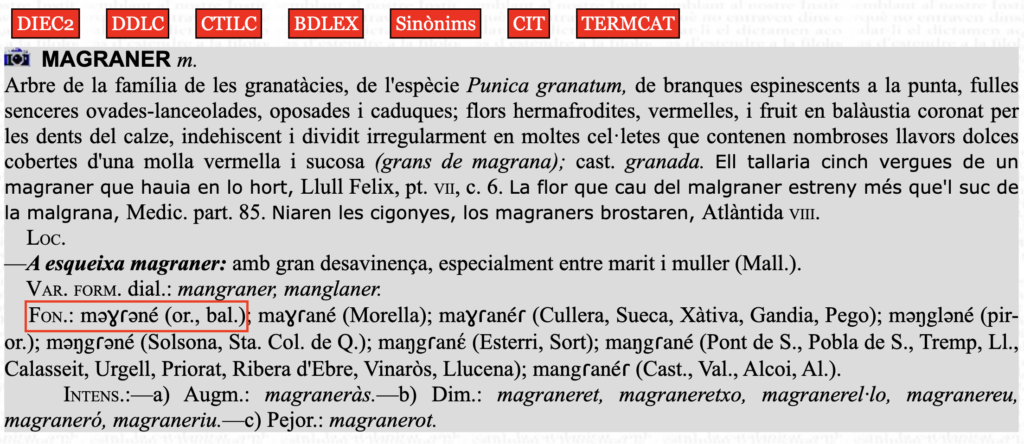
This helps to explain why I have seen spelling variations on the island of Puerto Rico from the original spelling of Magraner as “Magrane”, “Magrané” and “Magranet”.
Final thoughts
It is very rare that I overlap my two passions of genealogy and linguistics together but I am happy to have written this post about my journey learning Catalan. Ultimately, my process learning the language will help me better understand the documents I read and use while providing me a looking into the Mallorcan psyche as I better understand the language and the their connection to the mallorquí variant. Though I doubt there are genealogical webinars on how to use Catalan to understand certain documents, this is an area I can help develop in the future once I am more comfortable with the language.
I would love to one day be able to speak Catalan with enough fluency to be around an intermediate level speaker (B1-B2 on the CEFR). It would be great to reclaim this language as a part of my culture heritage like I have been able to do with French as well the last few years (the next step of course would be to add both Martiniquais Créole and Guadeloupéen Créole 😉).

